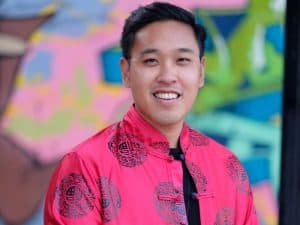Treatment Plan: An Essay by 2019 Emerging Voices Fellow Anthony Hoang

The 2019 Fellows have two months to go and they want to talk about their experience as Emerging Voices, in the hopes that they might inspire other writers in need to apply. Stay tuned to PEN America’s blog through July for this series of essays from Judy Choi, T.K. Lê, Dare Williams, Fajer Alexander Khansa, and Anthony Hoang. In this installment, Anthony Hoang shares the ameliorating effects of embracing his dream of being a writer.
Are you a writer? Apply to be a 2020 Emerging Voices Fellow through August 1 (PST.)
“Treatment Plan”
To Whom It May Concern,
I had a sickness.
The Symptoms: I suffered from a lack of meaning and an insatiable spiritual hunger.
I spent most of my young adulthood building a stable and well-rounded life. It included a job in finance that had a matching 401k, spontaneous trips to places like Istanbul and Morocco, and a membership to an expensive gym that had lavender scented towels. Except these things didn’t satisfy me. I had wanted to tell stories ever since I was a child, but I convinced myself it wasn’t a reasonable thing to do as a career, and I let that dream be unfulfilled.
When you are raised in a household and a culture that tell you that a stable job is all you need to be happy, you feel guilty for having dreams beyond that. My parents were not only immigrants from Vietnam, but they were also the children of immigrants from China, so practicality is in their blood. They never considered anything related to the arts a viable career.
I essentially did all the things that would make my parents proud. I tried everything to fill the void that existed in me except for writing itself.
The Diagnosis: After years of denial, I finally diagnosed myself as a writer.
The Treatment: Admitting that I was a writer was the first step, but in order to treat my ailments, I knew I would need to take writing seriously.
When I finally set pen to paper, I felt an inkling of my hunger being satiated. I spent the next three years working on a novel. I watched YouTube videos of instructors diagramming examples of story structure, took a free online survey course on the American Novel after 1945, and attended my first writing workshop. Eventually I applied to the PEN America Emerging Voices Fellowship.
The Fellowship was the ultimate embodiment of taking writing seriously. Heck, there was a syllabus and only one excused absence. It was what I needed. It included UCLA extension courses, one-on-one time with my terrific mentor, James Sie, who left me with two pieces of advice that I will always keep in mind:
1. “No writing is wasted writing because it all goes somewhere.”
2. “You just can’t make your story be about something; you have to write in order to find out what your story is about.”
I remember when I got into the Fellowship I sat down to explain what exactly a writing fellowship was to my mother and what it meant to me. When, after an entire evening, she still didn’t understand why I was taking time away from my job to write fiction, I broke down. I looked her in the face with swollen eyes and told her that I had a chance to be really good at something for the first time in my life. We sat quietly afterwards. I could see that she was attempting to say something, perhaps words that would comfort me, but couldn’t. She instead stared at the tops of her hands resting on her lap.
In the end, whether my parents were proud of me or not didn’t matter. Maybe they will one day understand what writing means to me or maybe they won’t. But I realized that by taking writing seriously I was taking my own dreams seriously. Not my friend’s dreams, not my parent’s dreams, but my dreams.
You should apply for the PEN America EV Fellowship because it means that you are doing something for yourself, and sometimes that’s the hardest thing to do.
Side Effects:
There are side effects to this treatment plan if you choose to take it. These include a lifting of the spirit, a desire to write endlessly, wonderful friendships, and finding yourself in the process.
Your fellow writer,
Anthony Hoang






